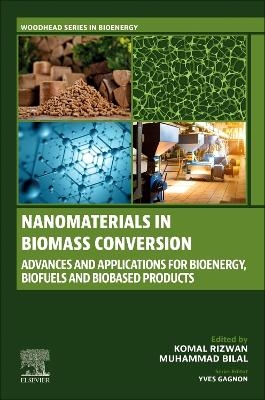
Nanomaterials in Biomass Conversion
Woodhead Publishing (Verlag)
978-0-443-13500-2 (ISBN)
She earned a Ph.D. in chemistry from Government College University Faisalabad Pakistan in 2016 and carried out research work at the University of Pennsylvania, Philadelphia, Pennsylvania, United States. She is interested in synthesizing molecules that possess interesting functions, including biological activity (natural products, drugs, drug-like compounds etc.) or materials with useful properties. She develops tools to perform efficient synthetic transformations in creating novel molecular architectures of medicinal or industrial relevance. In a nutshell, my interests are broadly in synthetic organic chemistry, with a particular focus on the synthesis of bioactive natural products and novel molecular architectures (nanomaterials). She worked on organic synthesis focused on catalysis, visible light photoredox couplings, transition metal-catalyzed -couplings, and click chemistry. Synthesis of nanomaterials and their applications to control environmental pollution is also her area of interest. Muhammad Bilal is working as an Associate Professor at the Faculty of Civil and Environmental Engineering, Gdansk University of Technology, Poland. Previously, he served as an assistant/associate Professor at Poznan University of Technology, Poland, and the School of Life Science and Food Engineering, Huaiyin Institute of Technology, Huaian, China. He earned his Ph.D. from Shanghai Jiao Tong University, specializing in bioengineering and applied biotechnology. His main research activities are oriented to Environmental biotechnology, nanotechnology, enzyme engineering, immobilization, chemical modifications, and industrial applications of microbial enzymes, liquid, and solid waste management. He has authored over 700 peer-reviewed articles, 150 book chapters, 25 edited books. Dr. Bilal is the associate editor of Frontiers in Chemical Engineering and Frontiers in Environmental Science (Frontiers), and an editorial board member for several journals. He was listed as a highly cited researcher (Clarivate) in 2021 and holds several "highly cited papers" in WOS.
Part I- Fundamentals 1. Biomass Feedstock: A sustainable source of energy production 2. Introduction to Nanomaterials: A strategic tool for production of biofuels and bioenergy from biomass 3. Chemical and bio-mediated processes for synthesis of nanomaterials 4. Nanomaterials derived from animals, plants and microbes for energy production 5. Physicochemical attributes, structural characterization, and catalytic properties of nanomaterials Part II- Nanomaterials for conversion of biomass to bioenergy, biofuels and value added products 6. Nanocatalytic processes for conversion of biomass to green fuels 7. Homogeneous and heterogeneous nano-catalytic systems for bioenergy and biofuel production 8. Nano photocatalytic conversion of biomass to bioenergy 9. Potential role of Nano-biochar, nano-cellulose and other nanomaterials in microbial fuel cell 10. Nano-biochar, nano-cellulose and other nanomaterials in bioelectrochemical system 11. Nano-cellulose based electrode systems in batteries for energy production 12. Nanomaterial assisted anaerobic digestion of biomass for bioenergy and biofuel production 13. Advances in nanomaterials for production of fuel gases from biomass 14. Nanoparticles-immobilized enzymes for biomass conversion 15. Developments in nanomaterials for conversion of biomass to Bio-based value added products 16. Production of volatile fatty acids from biomass, their recovery and applications in fuel and other valued products formation 17. Nanomaterials for carbon capture and their conversion to useful products for sustainable energy production Part III: Risk Assessment, Economic growth, Challenges and future perspectives 18. Recent advancements in nanomaterials for mitigation of carbon footprints 19. Recovery of resources and Circular-Economy from biomass derived waste through aerobic and anaerobic digestion-based techniques 20. Potential risks, Toxicology, stability, Economic feasibility and environmental impacts of biomass conversion 21. Challenges and future prospective of biomass conversion to various products
| Erscheinungsdatum | 05.03.2024 |
|---|---|
| Reihe/Serie | Woodhead Series in Bioenergy |
| Sprache | englisch |
| Maße | 152 x 229 mm |
| Gewicht | 1000 g |
| Themenwelt | Technik ► Elektrotechnik / Energietechnik |
| Technik ► Maschinenbau | |
| ISBN-10 | 0-443-13500-2 / 0443135002 |
| ISBN-13 | 978-0-443-13500-2 / 9780443135002 |
| Zustand | Neuware |
| Informationen gemäß Produktsicherheitsverordnung (GPSR) | |
| Haben Sie eine Frage zum Produkt? |
aus dem Bereich


